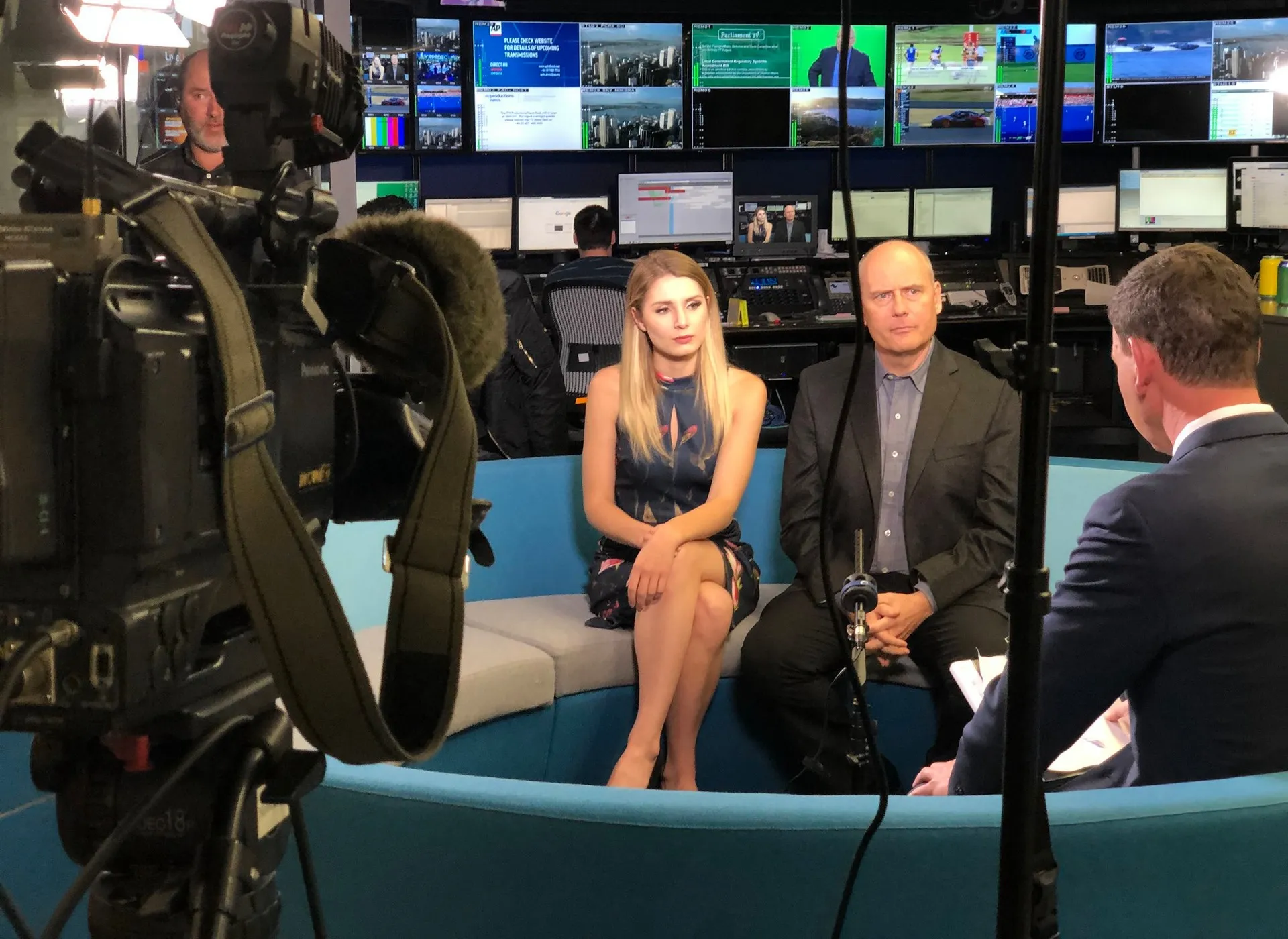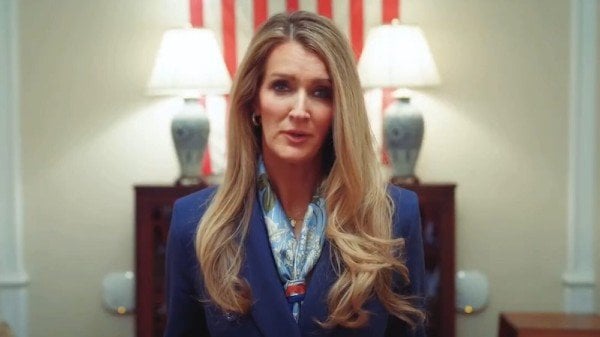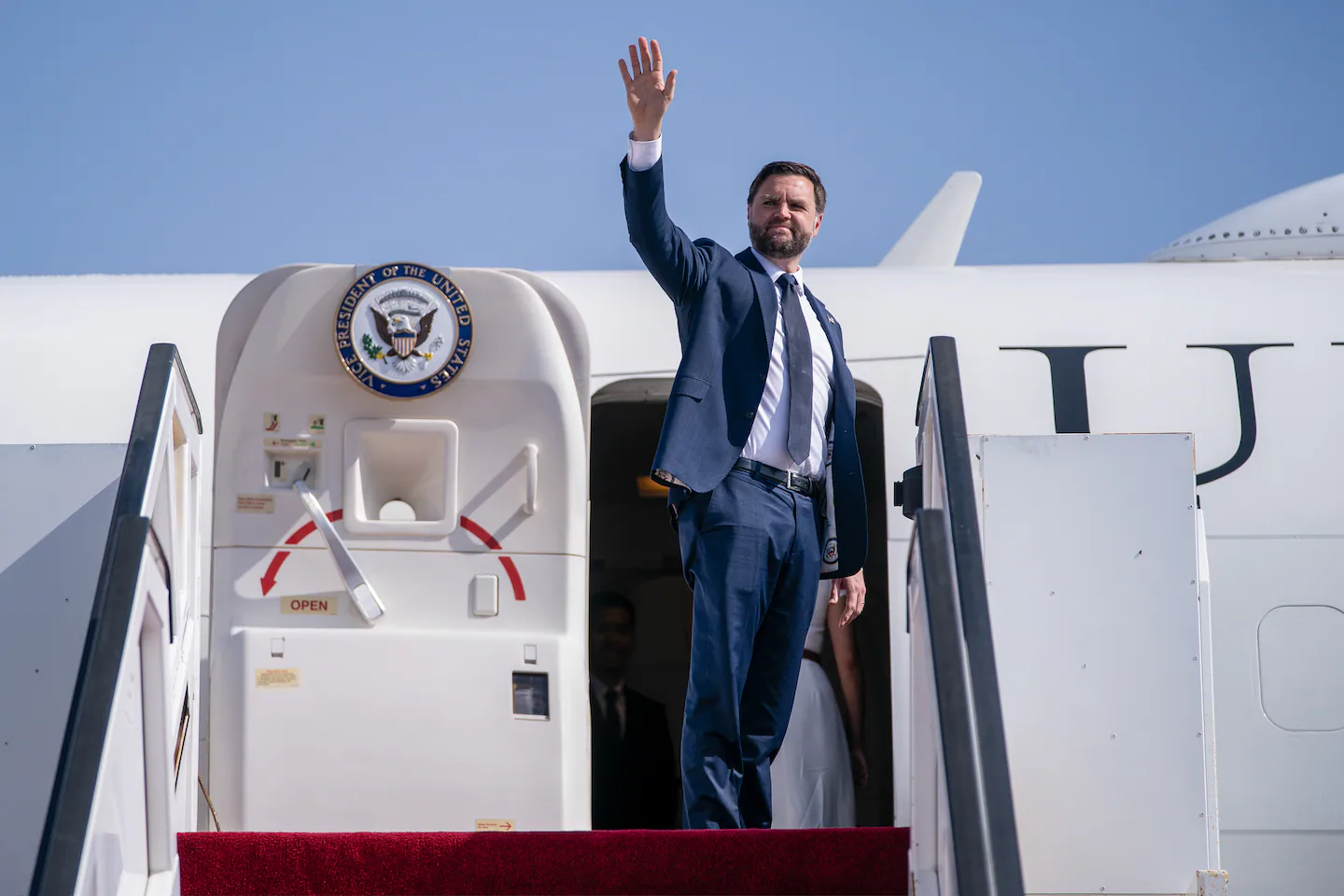Copyright newsroom

It was born over a weekend in July 2018. After Canadian right-wing provocateurs Lauren Southern and Stefan Molyneux were blocked from speaking at Auckland Council venues, staff at the free-market think tank the Taxpayers Union spent the weekend in Wellington brainstorming. As a 2022 North & South magazine piece tells it: “By 10am Monday, they had opened a bank account and created a website. The Free Speech Coalition was born.” These days, the Free Speech Union (it formally registered as a trade union in 2021) is part of our societal furniture. In October, the Broadcasting Standards Authority decided to investigate a complaint about Sean Plunket’s online outfit The Platform, sparking a free speech panic. Some asked: Is the regulator coming for the internet? Prime Minister Christopher Luxon expressed sympathy for Plunket at his post-Cabinet press conference, and suggested it was the victim of regulatory overreach, while headline-grabbing New Zealand First leader Winston Peters accused the regulator of “Soviet-era stasi” censorship. Burrow into the reporting on Platform-gate – not every story, mind – and readers would find a ubiquitous, trusted voice on this issue: the Free Speech Union. Chief executive Jillaine Heather called the BSA probe “mission creep”, and a serious threat to free expression. It’s just the latest example of free speech issues breaking into the mainstream. Think about Winston Peters being heckled at a Wellington railway station in May, or the collection of hate data by police. The issue’s also political. When the University of Auckland’s council voted to make its Waipapa Taumata Rau course optional the Act Party celebrated. And the National-Act coalition agreement contained a promise to change the law, forcing tertiary institutions to create specific free speech policies. All the while, the union is a go-to voice for media comment, with the potential to frame an issue. Because it’s an incorporated society, the union’s annual accounts are public. Its “business” is listed as “defending and promoting the fundamental human right of freedom of speech for New Zealanders”. Logically, then, we should all benefit from its work. But there’s another aspect of its financials that worry some people – the lack of transparency. Its income more than doubled from 2021 to 2023, from $354,851 to $963,471, with donations going from $322,286 to $844,262. (The organisation employs six staff, three of them part-time.) Even before its war chest expanded, the union’s influence was being felt. It up-ended the public consultation on hate speech laws, and was prominent in debates about Covid restrictions. However, the union’s critics say its veneer of reasonableness hides a darker mission of knocking institutions, sowing the seeds of racial division, and importing culture wars on issues like transgender rights. Some, like University of Auckland academics Sereana Naepi and Peter Davis, say a free speech “crisis” at universities has been manufactured – and amplified by like-minded groups, like the NZ Initiative. Yet at the time when free speech is making worldwide headlines because of Charlie Kirk’s murder, is the Free Speech Union, under new leadership, about to take a more moderate approach? On a Tuesday in mid-October, I have a three-way phone conversation with Heather, the union chief executive, a former lawyer and human resources specialist, and the group’s chair Stephen Franks, a prominent Wellington lawyer. (The preamble about being able to patch another person to a call would have amused millennials and the tech-savvy.) Franks asks about the timing and context of Newsroom’s story. Is it tethered to a particular event? Or is this, perhaps, a spontaneous profile piece? We explain it’s the result of Official Information Act requests to universities (part two of our series) for correspondence with the union, and changes to the Education and Training Act passing through Parliament (part three). The union has myriad methods of influence, including lobbying, legal challenges (like the one involving Chinese-New Zealand journalist Portia Mao) and publicity campaigns. How effective has it been? Franks says its biggest success was “probably that New Zealand steered away from going down the route that the UK and Ireland and others have gone to hate speech law”. “And I’m guessing that New Zealand police and the courts and others would be pretty grateful, or ought to be very grateful now, as the quagmire has emerged.” It achieved this, he says, by mobilising “ordinary New Zealanders’ anxiety” about who would have the power of determining what hate speech was. Heather says New Zealanders benefit from its campaigns, advocacy and lobbying, as it defends the speech rights of all Kiwis. “We’ve got a very big mailing list,” Franks says, and then asks Heather for actual numbers. “We literally do have a 100,000 subscriber list, which is significant for a civil liberties organisation,” Heather says, calling it the single most effective way it has to make change. Franks enthuses: “It’s quite an astonishing reach.” (According to its latest accounts, the union has 950 union members. It’s followed by 44,000 people on Facebook.) What about its campaigns and messages being amplified or boosted by aligned groups, like Hobson’s Pledge, the Taxpayers’ Union and the NZ Initiative? The relationship with the Taxpayers’ Union is direct – its executive director, Jordan Williams, sits on the union council, and the two bodies share a financial resource. The union’s annual accounts were submitted by Sara Leckie, the Taxpayers’ Union’s office and finance manager. Franks says there’s no formal link to other groups, other than, perhaps, an alignment of concern about suppression. “We put material out there. Obviously, if others pick it up we’re delighted.” However, the cross-promotion and crossover is obvious. For example, last year, the NZ Initiative published a report called ‘Unpopular Opinions’, written by James Kierstead, a former senior lecturer in classics, with major contributions by Michael Johnston, a cognitive psychologist and former associate dean at Victoria’s school of education. The report called heavily on the results of the Free Speech Union’s staff and student surveys, and comments from participants. Kierstead and Johnston serve on the union’s inter-university council on academic freedom. The pair have appeared on the union’s podcast, while Jonathan Ayling, the union’s former chief executive, and the group’s international speakers, have appeared on Kierstead and Johnston’s podcast, Free Kiwis! (Kierstead, who has contributed pieces to Newsroom, says there are no formal ties between the Initiative and the union, although they collaborated on a symposium on the future of universities last year. “From our perspective, we are trying to contribute to an important debate about an important principle, and to do so in an evidence-based way.”) Free Speech Union chair Franks says there’s overlap with the agenda of the Taxpayers’ Union, and lobby group Hobson’s Pledge, which often criticises Treaty-based policies and railed against co-governance, but “it doesn’t influence anything we do”. “I don’t think we’ve ever had a meeting with either of them,” he says. “We’ve never met their board; we’ve never met the board of Hobson’s. I don’t think we routinely talk.” In 2023, Hobson’s Pledge pointed members to the union’s submission tool for proposals to regulate speech on social and traditional media. A few months later, founder Don Brash, a former political leader, plugged a Free Speech Union-organised debate to Hobson’s members. Heather, the union chief executive, says: “There’s no shared structures, communication strategies, WhatsApp groups, or anything with those other organisations.” (Brash says: “Our interests have overlapped on occasion, for example in the case of Janet Dickson. However, we have no formal relationship or organised cooperation.”) What about the union’s relationship with political parties? Franks says of Act: “We expect them to be on the side of free speech but they certainly haven’t been very vigorous on it.” Meanwhile, Heather says the union supports good laws on either side of the political aisle, including Green MP Kahurangi Carter’s Copyright (Parody and Satire) Amendment Bill. Adds Franks: “We’ve basically been keen to make sure that anyone from any party who’s got a free speech interest can feel that we’ll be able to give them information, we’ll be able to support them, praise them if they do something that supports free speech.” The Free Speech Union’s work is organic, Franks says, depending on “issues that get forced on us”. He mentions the case of Lucy Rogers, a criminal defence lawyer arrested for breaching the peace in Auckland in November 2023. Rogers held a sign reading “Selective condemnation of genocide is evil” during a pro-Palestinian protest. “We couldn’t leave her alone on it,” Franks says. “Some things just demand our resources because they occur but others will reflect the passions of board members, and, of course, Jillaine will have a big influence.” We ask Heather how her approach would differ to that of her predecessor. “I’d like to look at more proactive measures, in terms of how do we elevate why freedom of speech is important for a democracy, for a flourishing community?” That might be something in the “broader education space”, she says. We ask for examples. Franks says the union has drafted a number of bills, and suggested legislative amendments. “Jillaine’s talking about something more organic, trying to model discussion between people with wildly different views.” He then speaks to Jillaine directly: “I’m going to have to make sure that you’re still out there punching and kicking.” There’s the union pitch: It’s a nimble, non-partisan organisation that reacts to serious transgressions of free speech, with loose associations with like-minded groups but no formal ties. Someone who’s seen a Free Speech Union campaign up close is Abdur Razzaq, chair of advocacy for the Federation of Islamic Associations of New Zealand (Fianz). After riding a wave of anti-establishment sentiment prompted by Covid-19 lockdowns, the Free Speech Union resonated more widely after the Royal Commission into the 2019 Christchurch terror attack reported back. Razzaq tells Newsroom: “There’s no doubt that Free Speech Union has lobbied very well and very strategically to get its position across, not just to politicians but also the civil service as well as the public through the media.” The commission recommended legislative gaps for hate speech be filled. It suggested repealing the section of the Human Rights Act dealing with inciting racial disharmony, and inserting a provision in the Crimes Act making the incitement of racial or religious disharmony an offence. Justice Minister Kris Faafoi announced proposed changes in 2021 but, after a car-crash TV interview, he and Prime Minister Jacinda Ardern failed to adequately explain where a new law might draw the line. The Free Speech Union filled the vacuum. A six-week public consultation in 2021 attracted 19,228 submissions, 15,235 of which used the union pre-populated online form. (Fianz said politicians were swayed by fictitious numbers.) Razzaq says the Royal Commission wanted vulnerable communities protected by legislation but the union turned it into a free speech issue. “They changed the agenda completely. What they forgot is people get hurt as a result of incitement.” The Labour government put hate speech reforms on the backburner and then, after the change of government in 2023, they were torched in a policy bonfire. Razzaq says Fianz agrees society can’t be changed by legislation alone, that’s why the Royal Commission called for more education and social cohesion programmes. There should be a healthy public debate about responsible speech and hate speech, he says, but that doesn’t appear to be on the legislative agenda – unlike a new law to make it an offence to protest outside someone’s home. “Well, people are protesting in front of our faces, and our children, and we’ve got no relief from that.” American investigative researcher Ralph Wilson, of California, founded the Corporate Genome Project, and co-authored the 2021 book ‘Free Speech and Koch Money’. He tells Newsroom: “Without transparency, the true intent of these groups are obscured to most of the public, as it will remain unclear whose interests are ultimately being served.” (“I’m happy for donors to announce themselves,” Heather says, “but I wouldn’t declare them publicly without their permission.”) Wilson says the tactics used by the Free Speech Union are “identical” to those used by free speech advocates in the United States and other English-speaking countries like Canada, the United Kingdom and Australia. Those tactics include surveying academics, university rankings, claims of a free speech crisis on campuses, lobbying for and drafting new legislation, and hosting controversial speakers. (Franks says the inspiration for the union surveys came from the United States but that’s because “a lot of the academic culture seems to be very derivative and very imitative”. Of universities, he says: “They’re dreadful places for making people feel scared to speak freely.”) Wilson says they’ve helped far-right or corporate-backed groups gain a foothold on US college campuses, he says, allowing them to train and recruit new members. “Well-meaning people are fooled into believing that these efforts protect free speech or comport with academic freedom, when nothing could be further from the truth.” (Heather, the Free Speech Union chief executive, says it has defended the likes of drag queen storytime events and pro-Palestinian protestors. “Currently, those on the right are cancelled more often than others so this is represented in our cases, but we believe this will shift.”) There’s a chilling effect on critics – in the US and New Zealand. Newsroom approached several academics for comment on this story, one of whom declined, adding: “I’d rather not become a target of an FSU bullying campaign.” Professor Mohan Dutta, Massey University’s Dean’s Chair in Communication, researches culture-centred approaches in health and post-colonialism, including global threats to academic freedom. Dutta has written a series of pieces attacking the far-right and university cancel culture, including a pointed piece, last year, on the Free Speech Union. In September this year, an attempt by Act to pay tribute in Parliament to assassinated conservative commentator Charlie Kirk was blocked. On X, National Party pollster David Farrar described this as “sad”, to which Dutta responded Kirk was a white-supremacist, far-right figure. “That there was an attempt to pay homage to him in the NZ Parliament should give you a full list of who the backers of the far right are in NZ mainstream politics.” Southland MP Joseph Mooney, of National, responded: “In the spirit of the same free speech you’re enjoying to express your views, my view is that New Zealand doesn’t need a ‘Professor of Communication’ at one of its universities encouraging this kind of divisive and hyper-politicised rhetoric…” (This “story” was covered by a constellation of alternative websites.) Dutta tells Newsroom the Free Speech Union seeks to project a crisis of free speech at New Zealand universities through surveys with flawed design and sampling, underpinned by a deliberate conflation of academic freedom and freedom of expression. “I see it as part of this broader movement of creating a crisis around universities, which is a manufactured crisis, which I see actually as a threat to academic freedom in the long term.” (In part three of our story, New Zealand Initiative senior fellow James Kierstead discusses problems with the 2023 Free Speech Union survey but also how the results gel with five other surveys. The University of Auckland’s staff surveys have high participation rates. In 2023, 38 percent of academics answered positively “I am able to respectfully voice my views without fear of negative impact”. In this year’s survey, 48 percent of staff, not just academics, answered the question in the affirmative.) On academic freedom, Dutta explains: “If I’m not an expert in kaupapa Māori, I don’t have the academic freedom to deliberate on, and pontificate on kaupapa Māori. Sure I have that as my freedom of speech but that’s not my academic freedom, and I think that delineation is obfuscated.” Dutta acknowledges the Free Speech Union’s membership has grown in recent years but still calls it an astroturf organisation – something made to look like it comes from grassroots without clarity about its funding sources. One funding source acknowledged by the union is the Atlas Network, a global umbrella group for free-market think tanks. Heather, the Free Speech Union chief executive, confirms the Atlas Network provided “some funds to back our campaign against gang patch law, kick off professional membership initiatives, and our 10 year review of the Harmful Digital Communications Act”. She didn’t put a number on it, but said it was less than 10 percent of total donations. Dutta, the Massey professor, says Atlas offers training, marketing materials, and campaign training for various affiliates, including New Zealand’s Taxpayers’ Union and the NZ Initiative. That helps to shape a particular policy environment, Dutta says, which, in the US, has been deployed to target academic freedom. “If you think the independence of our institutions are critical to our democracy, then I think that it is really important that we have clear understanding of where the funding for these organisations comes from.” Authors George Monbiot and Peter Hutchison argue in their book ‘The Invisible Doctrine, The Secret History of Neoliberalism’, that companies and oligarchs “insert their demands into the political conversation through their well-funded proxies”, including through the Atlas Network of nearly 500 think tanks worldwide. “As successive governments quietly delegate policy-making to opaque, corporate-funded lobby groups, democracy is reduced to a sideshow.” In the book ‘Free Speech and Koch Money’, Wilson and co-author Isaac Kamola argue the public shouldn’t be debating who has the right to speak on campus. “We should instead by asking: ‘Who funds these speakers? Who brings them to campus? And why?’” Newsroom asked Commerce and Consumer Affairs Minister Scott Simpson if there should be improved disclosure rules for big-money donors to incorporated societies, charities, and unions. He didn’t answer the question. “Most incorporated societies would not fall into the categories of organisation you are interested in – for example, they are sports or community clubs,” Simpson says. “Incorporated societies must follow the financial reporting rules set out in the Incorporated Societies Acts 1908 and 2022.” Act leader David Seymour, the Deputy Prime Minister and free speech champion, was asked if the public should have transparency about who is donating to the likes of the Free Speech Union and the Taxpayers’ Union. “Whether someone is donating to the Free Speech Union, Greenpeace or even the Helen Clark Foundation, they should be able to donate to a cause while maintaining their privacy, so they’re not harassed for doing so.” Seymour said the premise of Newsroom’s story “seems to be that people are inherently venal”. (This is not the case. Our Who Benefits series tries to unpick how influence works and as one of its focal points, asks if the public should have a right to know where the funding comes from.) “If you know who is funding them, the premise goes, you can support or dismiss their views. That is a cynical, anti-intellectual premise that Newsroom is buying into. “Worse, Newsroom does this selectively. If you devoted the same amount of time to trying to find conspiracies within left-wing donor organisations like Greenpeace or Toitu te Tiriti as you did to the Taxpayer’s Union and Free Speech Union, you might have more credibility.” (For the record, we’d welcome tips on left-wing groups and their influence. Further lobby groups to be examined over the year will push causes across the political spectrum) Franks, the Free Speech Union chair, explains the recent rise in donations by saying people are seeing what’s happening to free speech and have donated to the union as “a way of being practical about their fear or their opposition”. Chief executive Heather says about 60 percent of its money come from “small money” donors, with the balance, above the average of $95 per person, coming from about 3000 people. Do large donors to the union get benefits? “They get access to me,” Heather says. “Sometimes they get to meet the speakers that we bring out.” There’s no formal structure, says Franks, unlike political parties’ clubs costing thousands of dollars to join. One of the responsibilities of board members is to thank supporters, he says. “When I was in Wanaka recently, Jillaine told me that someone had given us a really big donation so I went and met them and had a very happy hour.” There are some expatriate donors, from the US and UK, Heather says, “but they live in New Zealand now”. The Free Speech Union has a broad donor base, she says, “but they don’t live abroad, as far as I understand”. In sum, who benefits from the Free Speech Union? All New Zealanders, say Franks and Heather, particularly if you consider where the country would be if hate speech laws had been enacted. However, critics, like Dutta and Wilson, suggest it’s often people of a right-wing political persuasion who benefit by being given a public platform to say things that marginalise already vulnerable parts of society – with few consequences. Abdur Razzaq, of Fianz, reminds us there are real people on the receiving end of an individual’s freedom of expression. Given the polarising debate in the US about free speech on college campuses, and the legislation passing through our Parliament forcing universities to commit to a free speech policy, it seems only time will help unwind the true positives and pitfalls of the union’s work.



